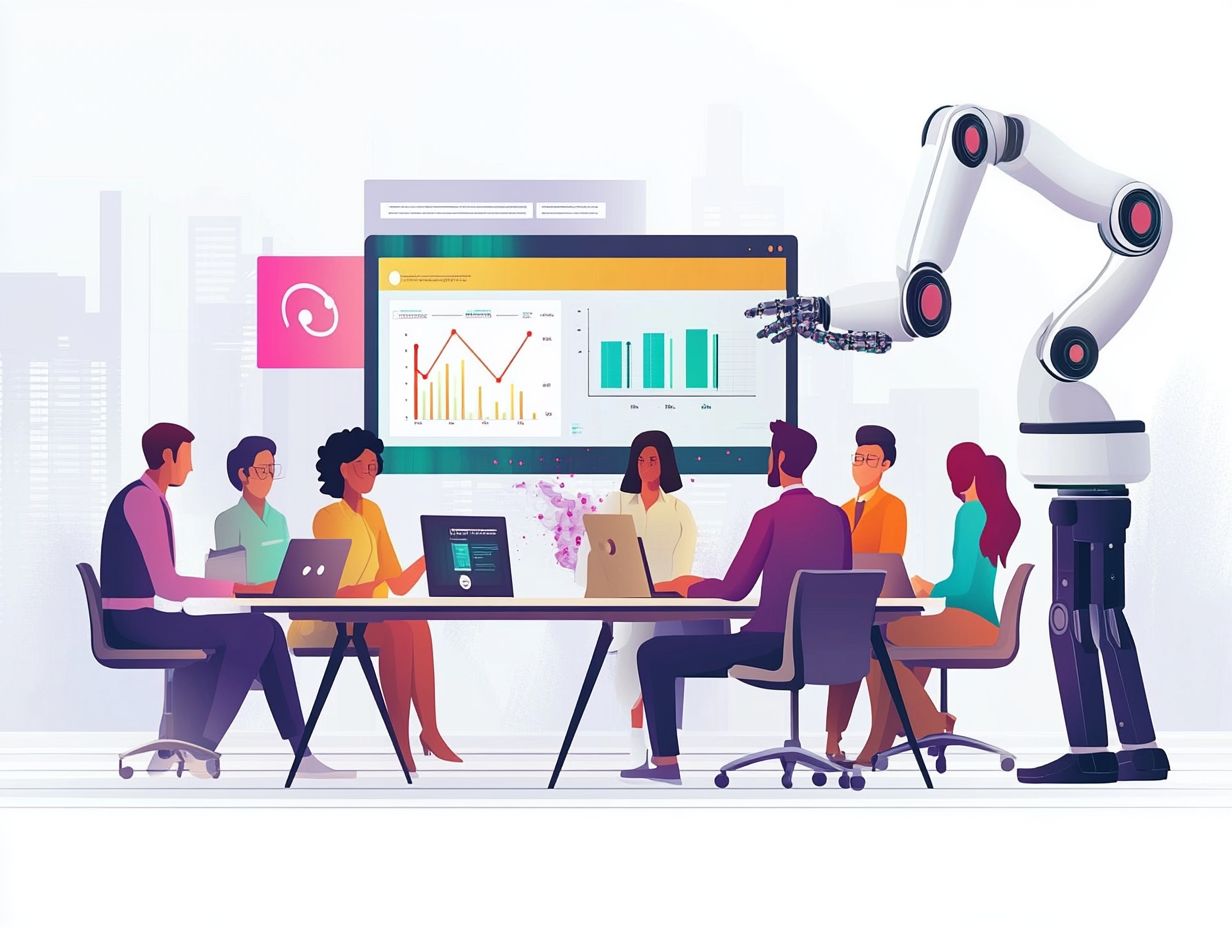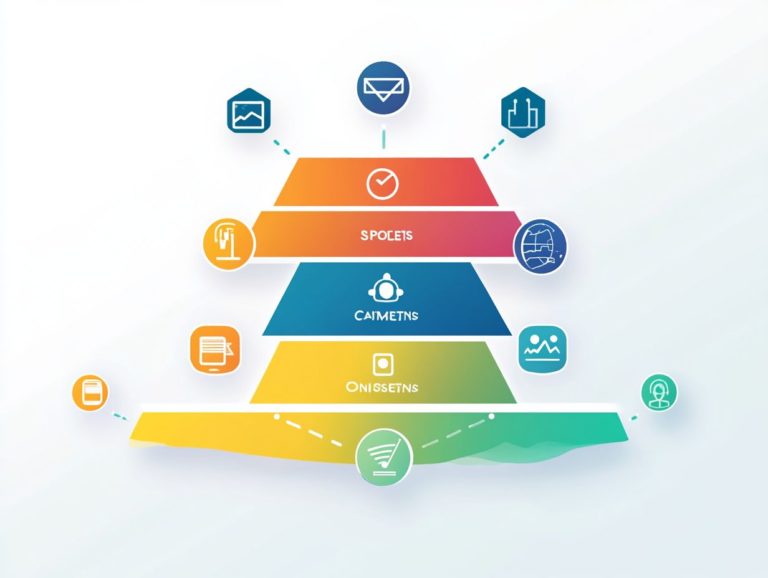The Role of AI in CRM Best Practices
Customer Relationship Management (CRM) has become an essential asset for businesses aiming to nurture meaningful connections with their clients.
As technology progresses, the integration of innovative tools is reshaping how companies interact with their customers.
This article delves into the core principles of CRM, showcasing the substantial benefits of enhanced data analysis and personalized interactions. It also outlines best practices for successful implementation.
You ll find real-world success stories highlighted, along with an exploration of future trends poised to further transform CRM.
Get ready to see how new technologies can take your customer relationships to the next level!
Contents
- Key Takeaways:
- The Basics of Customer Relationship Management (CRM)
- The Advantages of AI in CRM
- Best Practices for Implementing AI in CRM
- Real-World Examples of AI in CRM
- The Future of AI in CRM
- Frequently Asked Questions
- What is the role of AI in CRM best practices?
- How does AI improve customer relationship management?
- What are the benefits of using AI in CRM best practices?
- Are there any potential challenges or drawbacks to using AI in CRM?
- How can businesses effectively incorporate AI into their CRM best practices?
- Will AI replace human interaction in customer relationship management?
Key Takeaways:

AI enhances data analysis and insights, allowing for a deeper understanding of customer behavior and preferences. By using AI, businesses can improve customer engagement and personalization, leading to better relationships and increased satisfaction.
When implementing AI in CRM, it is crucial to address data bias and integrate it seamlessly into existing systems for maximum effectiveness.
The Basics of Customer Relationship Management (CRM)
Customer Relationship Management (CRM) represents a strategic approach that emphasizes understanding and managing your interactions with customers throughout their journeys. This focus not only enhances customer satisfaction and loyalty but also propels business growth.
By effectively harnessing CRM technology, you can streamline your customer support, refine your marketing strategies, and cultivate stronger relationships with your clientele.
The primary objective of CRM is to centralize customer data, enabling you to analyze behavior and preferences. This ultimately results in improved customer engagement and heightened operational efficiency.
Defining CRM and its Purpose
Customer Relationship Management (CRM) encompasses the methods and tools you can use to effectively manage and analyze your interactions with customers throughout their lifecycle.
By utilizing CRM systems, you can significantly elevate customer experiences, customizing your services to align with individual preferences and needs.
These systems are also pivotal in boosting retention rates; satisfied customers are far more inclined to stay loyal, which ultimately translates to increased sales.
Effective CRM solutions also enhance operational efficiency by automating repetitive tasks, allowing your teams to dedicate their valuable time to cultivating stronger relationships.
This means you can not only track interactions but also gain profound insights into customer behavior, enabling you to anticipate market trends and adapt your strategies with agility.
The Advantages of AI in CRM
Integrating artificial intelligence into your Customer Relationship Management (CRM) systems offers a wealth of advantages that can profoundly elevate your business processes and customer interactions.
AI-driven systems use predictive analytics, a method that uses data to forecast future customer behavior, to deliver real-time insights into customer behaviors and preferences. This enables you to tailor your marketing strategies and enhance customer engagement.
By automating routine tasks and streamlining operations, AI technologies boost your operational efficiency, freeing you to concentrate on cultivating customer loyalty and fostering robust business growth.
Enhanced Data Analysis and Insights
AI-powered CRM systems elevate your data analysis game by harnessing predictive analytics to deliver real-time insights, helping you gain a clearer understanding of customer behavior. These insights are essential, as they enable you to fine-tune your marketing strategies, enhance customer engagement, and ultimately drive sales.
By leveraging cutting-edge AI technologies, you can sift through vast amounts of customer data swiftly, identifying trends and preferences that inform your decision-making.
Take, for instance, a retail company that embraced an AI-driven CRM; they experienced a remarkable 30% boost in customer retention rates because they could predict and address customer needs before they even arose.
This ability to derive deeper customer insights fosters personalized interactions, giving you a significant edge in today s data-driven marketplace.
Act now to leverage these CRM strategies and watch your business thrive!
Improved Customer Engagement and Personalization

Artificial intelligence significantly elevates your customer engagement and personalization efforts by harnessing smart AI tools that analyze customer preferences and behaviors.
This advanced technology enables you to customize interactions, ensuring that each message resonates uniquely with your individual customers.
For instance, e-commerce platforms deploy AI-driven recommendation engines that suggest products based on previous purchases and browsing history. This makes the shopping experience feel intuitive and tailored just for them.
Chatbots equipped with tools that understand human language offer real-time support, addressing inquiries in a remarkably human-like manner. Consider how brands like Netflix and Spotify have transformed user experiences by curating content suggestions that boost engagement and cultivate strong customer loyalty.
By strategically implementing AI, you can foster deeper connections and heighten customer satisfaction across various touchpoints.
Best Practices for Implementing AI in CRM
Implementing AI in Customer Relationship Management (CRM) demands your careful attention to best practices. This ensures a smooth integration while addressing data privacy and ethical concerns.
You must align AI capabilities with your CRM goals right now to build consumer trust while making sure that your data collection adheres to privacy regulations.
You can harness operational efficiencies through automation to optimize customer service delivery and significantly enhance the overall user experience.
Identifying and Addressing Data Bias
Identifying and addressing data bias is essential for ensuring that AI technologies in CRM provide fair and accurate insights into customer preferences.
These biases, often rooted in skewed datasets, can lead to decisions that unintentionally favor certain customer segments while sidelining others. This ultimately compromises the ethical foundations of AI methodologies.
To combat these biases, you should consider implementing robust data auditing practices. Rigorously evaluate your data collection processes for potential disparities.
Incorporating diverse datasets and regularly updating algorithms can ensure that your AI systems genuinely reflect the true population they serve.
Training your staff in the ethical considerations surrounding AI can further enhance awareness and accountability, creating a more equitable CRM environment.
Integrating AI into Existing CRM Systems
Integrating AI into your CRM can supercharge your operations! The journey begins with a thorough assessment of your current systems to pinpoint strengths and weaknesses.
This helps you identify where AI can make the most significant impact. Next, you’ll need to carefully select the appropriate AI tools that align with your specific needs and objectives think chatbots for customer service or predictive analytics, which predicts future sales based on past data.
Once you’ve made your selections, training your staff becomes essential. Equipping your employees with the necessary skills will maximize the benefits of automation and ensure that the integration is both effective and seamless.
This thoughtful approach not only streamlines your processes but also significantly boosts customer satisfaction and engagement.
Real-World Examples of AI in CRM
Real-world examples of AI in Customer Relationship Management (CRM) vividly illustrate the transformative impact of technology on customer interactions and business outcomes.
You ll find that numerous organizations have embraced AI-driven systems to elevate their CRM strategies, leading to remarkable success stories.
These success stories showcase how businesses not only delight customers but also boost efficiency!
Success Stories and Case Studies

Success stories and case studies of AI in CRM show how technology enhances customer support. This can propel your business growth.
In e-commerce, many organizations are integrating AI tools into their CRM systems. This leads to significant boosts in customer satisfaction scores.
For example, companies like Shopify use AI chatbots to address common inquiries. This reduces response times and lets human agents focus on complex challenges.
While challenges like data privacy and staff training arise, the results are truly transformative. This integration streamlines onboarding and personalizes communication, building stronger customer relationships.
The Future of AI in CRM
Get ready! The future of AI in CRM promises exciting innovations that will change your customer experiences and business strategies.
As AI evolves, using advanced analytics and smart learning systems becomes essential. This approach allows you to create personalized experiences that build loyalty and drive growth.
Potential Developments and Trends
Upcoming trends in AI for CRM indicate a major shift toward enhanced customer engagement. This involves predictive modeling and real-time data analysis.
This evolution allows you to anticipate customer needs, tailoring interactions with precision. Leveraging AI-driven insights helps you understand consumer behavior and craft personalized experiences.
With smart learning systems, you can predict trends and customer preferences. This allows you to proactively address inquiries and enhance service delivery.
As these innovations integrate into CRM systems, they will transform how you interact with customers. This will improve business outcomes and increase satisfaction in a competitive landscape.
Frequently Asked Questions
What is the role of AI in CRM best practices?
The role of AI in CRM software best practices is to enhance customer relationship management. It uses smart algorithms to analyze data and make data-driven decisions.
How does AI improve customer relationship management?

AI improves CRM by automating routine tasks like data entry and lead scoring. This frees up time for employees to build relationships with customers.
What are the benefits of using AI in CRM best practices?
Benefits of using AI in CRM include improved efficiency, increased customer satisfaction, and more targeted marketing. AI also helps businesses adapt to changing customer needs.
Are there any potential challenges or drawbacks to using AI in CRM?
AI brings many benefits, but challenges exist. These include initial investment costs, potential biases in decision-making, and data privacy concerns.
How can businesses effectively incorporate AI into their CRM best practices?
To incorporate AI into CRM best practices, businesses should identify the key areas where AI can add the most value. Understanding the role of CRM in enhancing customer experience is crucial. Invest in reliable AI technology and ensure employees are trained to use these tools effectively.
Regularly evaluate and adjust your AI strategies. This will help you maximize the benefits of AI in your CRM practices.
Will AI replace human interaction in customer relationship management?
No, AI will not replace human interaction in customer relationship management. While AI can handle some tasks automatically, it can’t replicate the empathy and creativity that humans bring.
AI is here to enhance human efforts, not replace them. It supports our work, making customer interactions better and more efficient.






